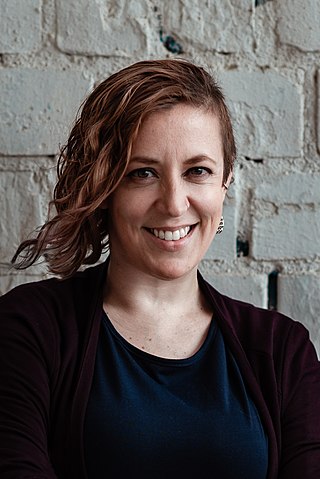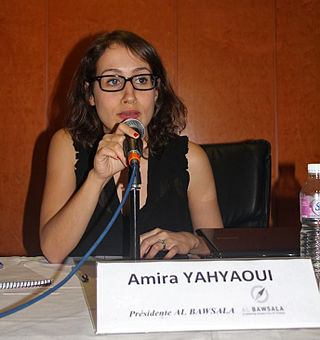
Hossein Derakhshan, also known as Hoder, is an Iranian-Canadian blogger, journalist, and researcher who was imprisoned in Tehran from November 2008 to November 2014. He is credited with starting the blogging revolution in Iran and is called the father of Persian blogging by many journalists. He also helped to promote podcasting in Iran. Derakhshan was arrested on November 1, 2008 and sentenced to 19½ years in prison on September 28, 2010. His sentence was reduced to 17 years in October 2013. He was pardoned by Iran's supreme leader and on November 19, 2014, was released from Evin prison.

Reporters Without Borders is an international non-profit and non-governmental organization focused on safeguarding the right to freedom of information. It describes its advocacy as founded on the belief that everyone requires access to the news and information, in line with Article 19 of the Universal Declaration of Human Rights that recognises the right to receive and share information regardless of frontiers, along with other international rights charters. RSF has consultative status at the United Nations, UNESCO, the Council of Europe, and the International Organisation of the Francophonie.
Internet censorship in Tunisia significantly decreased in January 2011, following the ouster of President Zine El Abidine Ben Ali, as the new acting government removed filters on social networking sites such as YouTube.
Censorship in Tunisia has been an issue since the country gained independence in 1956. Though considered relatively mild under President Habib Bourguiba (1957–1987), censorship and other forms of repression became common under his successor, President Zine El Abidine Ben Ali. Ben Ali was listed as one of the "10 Worst Enemies of the Press" by the Committee to Protect Journalists starting in 1998. Reporters Without Borders named Ben Ali as a leading "Predator of Press Freedom". However, the Tunisia Monitoring Group reports that the situation with respect to censorship has improved dramatically since the overthrow of Ben Ali in early 2011.

Rached Ghannouchi, also spelled Rachid al-Ghannouchi or Rached el-Ghannouchi, is a Tunisian politician, the co-founder of the Ennahdha Party and serving as its intellectual leader. He was born Rashad Khriji.

Internet censorship is the legal control or suppression of what can be accessed, published, or viewed on the Internet. Censorship is most often applied to specific internet domains but exceptionally may extend to all Internet resources located outside the jurisdiction of the censoring state. Internet censorship may also put restrictions on what information can be made internet accessible. Organizations providing internet access – such as schools and libraries – may choose to preclude access to material that they consider undesirable, offensive, age-inappropriate or even illegal, and regard this as ethical behavior rather than censorship. Individuals and organizations may engage in self-censorship of material they publish, for moral, religious, or business reasons, to conform to societal norms, political views, due to intimidation, or out of fear of legal or other consequences.
Internet censorship in Vietnam is implemented in the country, according to a 2009 report from Reporters Without Borders. Vietnam regulates its citizens' Internet access using both legal and technical means. The government's efforts to regulate, monitor, and provide oversight regarding Internet use has been referred to as a "Bamboo Firewall".

World Day Against Cyber Censorship is an online event held each year on March 12 to draw attention to the ways that governments around the world are deterring and censoring free speech online. The day was first observed on 12 March 2008 at the request of Reporters Without Borders and Amnesty International. A letter written by Jean-François Julliard, Secretary-General of Reporters Without Borders, and Larry Cox, Executive Director of Amnesty International, was sent to the Chief Executive Officers of Google, Yahoo!, Inc., and Microsoft Corporation to request observation of the day. The annual event is symbolized by a logo created by Reporters Without Borders consisting of a computer mouse breaking free from a chain.

Jillian C. York is an American free-expression activist and author. She serves as Director of International Freedom of Expression at the Electronic Frontier Foundation (EFF), and a founding member of Deep Lab. She is the author of Silicon Values: The Future of Free Speech Under Surveillance Capitalism and Morocco - Culture Smart!: the essential guide to customs & culture.

Ali Hassan Abdullah Abdulemam, widely known as Ali Abdulemam is a Bahraini liberal blogger and contributor to Global Voices. He is the founder of Bahrain Online, a popular online forum and pro-democracy news website, and a member of the research and advocacy group Bahrain Watch. Although he went into hiding in March 2011 to escape the Bahraini Government's crackdown on protesters, he was convicted in absentia for plotting to overthrow the Government, and sentenced to 15 years in prison. Global human rights organizations are unconvinced of Abdulemam's guilt and have voiced opposition to the persistent censorship and obstruction of journalists in the region. In 2013, Abdulemam escaped to the UK where he was swiftly granted political asylum.

The Tunisian revolution, also called the Jasmine Revolution and Tunisian Revolution of Dignity, was an intensive 28-day campaign of civil resistance. It included a series of street demonstrations which took place in Tunisia, and led to the ousting of longtime dictator Zine El Abidine Ben Ali in January 2011. It eventually led to a thorough democratization of the country and to free and democratic elections, which had led to people believing it was the only successful movement in the Arab Spring.

Slim Amamou ( is a Tunisian blogger and a former Secretary of State for Sport and Youth in the transitional Tunisian government of early 2011. He resigned from the role in the week of 25 May 2011 in protest of the transitional government's censorship of several websites.

The Arab Spring or the First Arab Spring was a series of anti-government protests, uprisings and armed rebellions that spread across much of the Arab world in the early 2010s. It began in Tunisia in response to corruption and economic stagnation. From Tunisia, the protests then spread to five other countries: Libya, Egypt, Yemen, Syria and Bahrain. Rulers were deposed or major uprisings and social violence occurred including riots, civil wars, or insurgencies. Sustained street demonstrations took place in Morocco, Iraq, Algeria, Lebanon, Jordan, Kuwait, Oman and Sudan. Minor protests took place in Djibouti, Mauritania, Palestine, Saudi Arabia and the Moroccan-occupied Western Sahara. A major slogan of the demonstrators in the Arab world is ash-shaʻb yurīd isqāṭ an-niẓām!.

Lina Ben Mhenni was a Tunisian Internet activist, blogger and lecturer in linguistics at Tunis University. She was internationally recognised for her work during the 2011 Tunisian revolution and in the following years.

Nawaat is an independent collective blog co-founded by Tunisians Sami Ben Gharbia, Sufian Guerfali and Riadh Guerfali in 2004, with Malek Khadraoui joining the organization in 2006. The goal of Nawaat's founders was to provide a public platform for Tunisian dissident voices and debates. Nawaat aggregates articles, visual media, and other data from a variety of sources to provide a forum for citizen journalists to express their opinions on current events. The site does not receive any donations from political parties. During the events leading to the Tunisian Revolution of 2011, Nawaat advised Internet users in Tunisia and other Arab nations about the dangers of being identified online and offered advice about circumventing censorship. Nawaat is an Arabic word meaning core. Nawaat has received numerous awards from international media organizations in the wake of the Arab Spring wave of revolutions throughout the Middle East and North Africa.
The level of Internet censorship in the Arab Spring was escalated. Lack of Internet freedom was a tactic employed by authorities to quell protests. Rulers and governments across the Arab world utilized the law, technology, and violence to control what was being posted on and disseminated through the Internet. In Egypt, Libya, and Syria, the populations witnessed full Internet shutdowns as their respective governments attempted to quell protests. In Tunisia, the government of Zine El Abidine Ben Ali hacked into and stole passwords from citizens' Facebook accounts. In Saudi Arabia and Bahrain, bloggers and "netizens" were arrested and some are alleged to have been killed. The developments since the beginning of the Arab Spring in 2010 have raised the issue of Internet access as a human right and have revealed the type of power certain authoritarian governments retain over the people and the Internet.

Bassel Khartabil, also known as Bassel Safadi, was a Palestinian Syrian open-source software developer. He was detained without trial by the Syrian government in 2012 and was secretly executed in 2015. Human rights organizations claim that he was detained for his activities in support of freedom of expression, and the United Nations Working Group on Arbitrary Detention considered his detention to have been arbitrary.

Women played a variety of roles in the Arab Spring, but its impact on women and their rights is unclear. The Arab Spring was a series of demonstrations, protests, and civil wars against authoritarian regimes that started in Tunisia and spread to much of the Arab world. The leaders of Tunisia, Egypt, Libya, and Yemen were overthrown; Bahrain has experienced sustained civil disorder, and the protests in Syria have become a civil war. Other Arab countries experienced protests as well.

Amira Yahyaoui is a Tunisian entrepreneur, blogger and human rights activist. She was previously the Founder and President of Al Bawsala, a multi-awarded transparency and accountability NGO.

Liberalism in Tunisia, or Tunisian Liberalism, is a school of political ideology that encompasses various political parties in the country.















